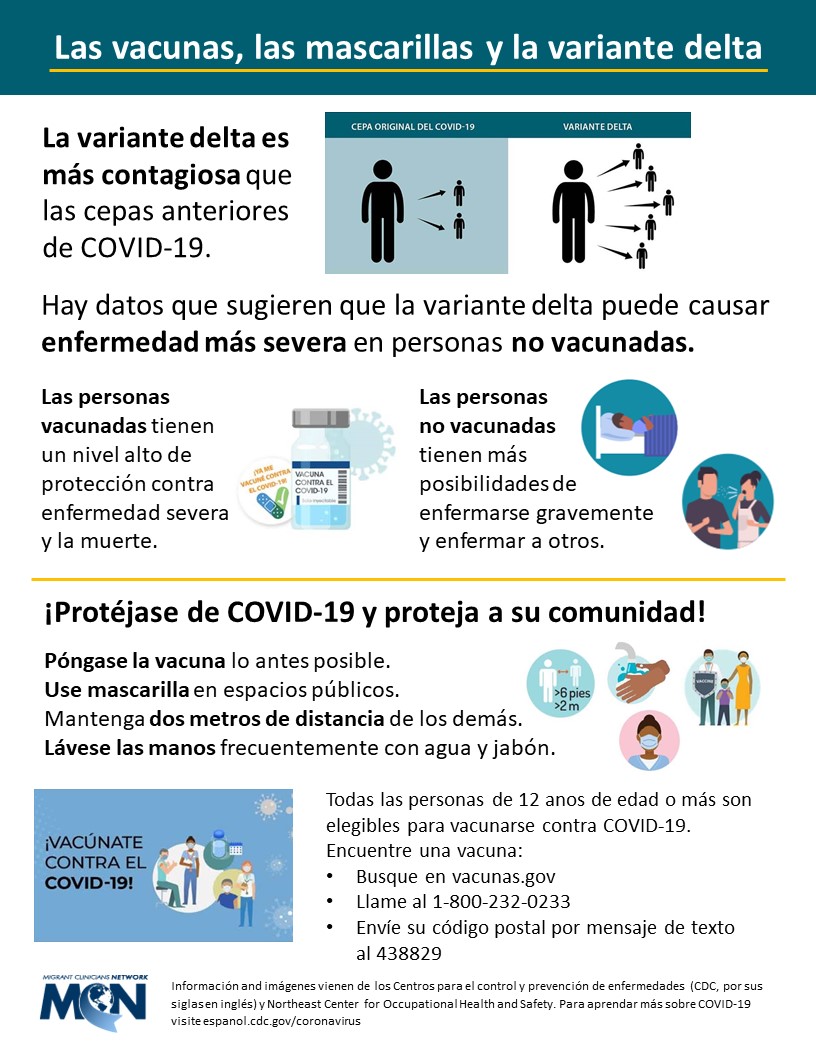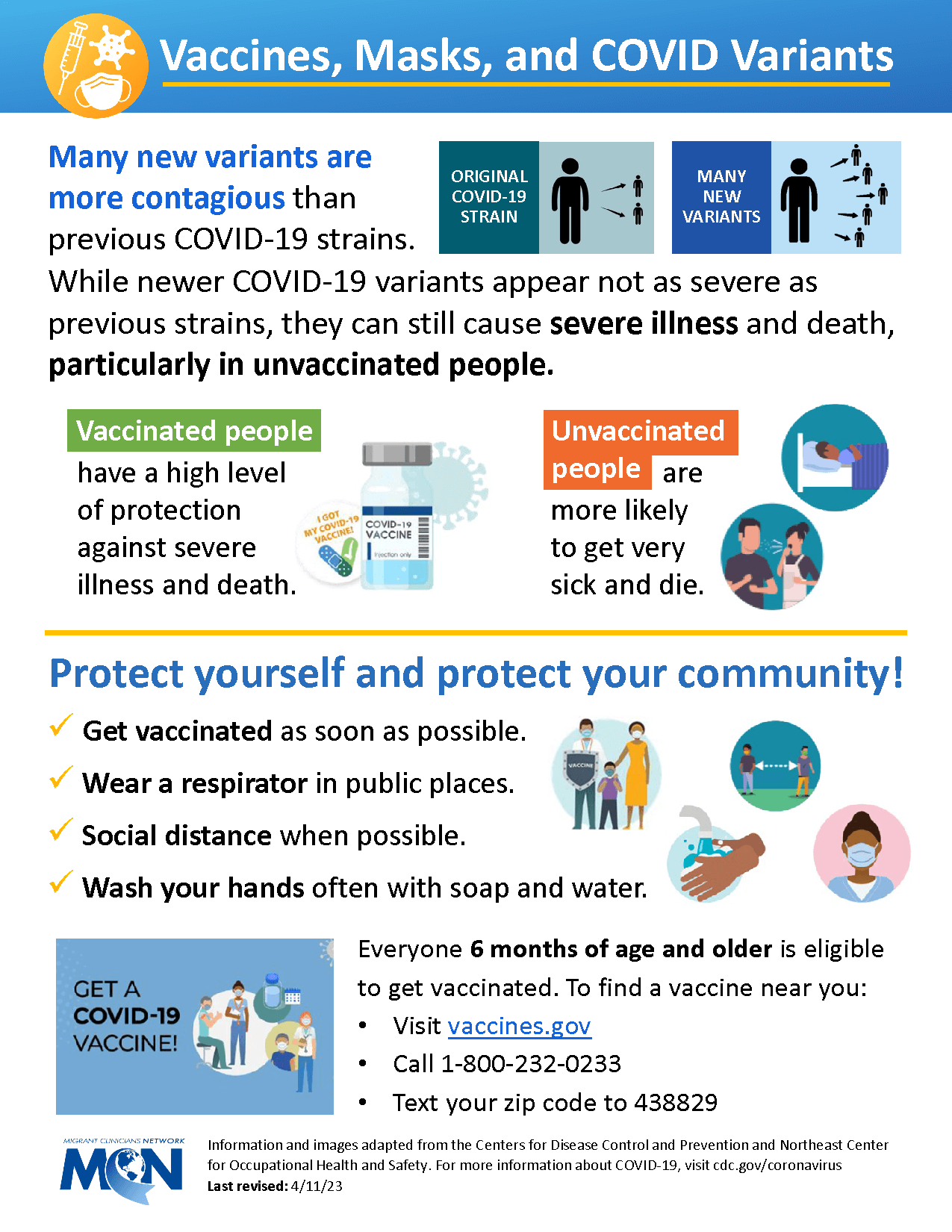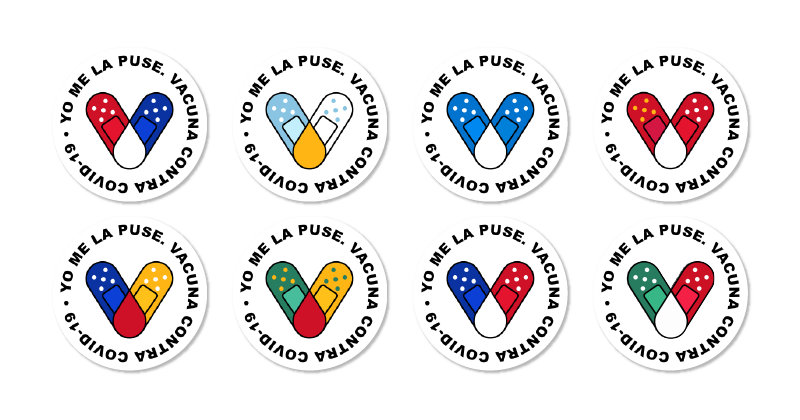

Download Resource
This resource provides information confirming the safety and effectiveness of the COVID-19 vaccine. It also includes recommendations for receiving the vaccine and COVID-19 prevention. This resource is available in pre-made and template format, and in three languages including English, Spanish, and Haitian Creole.
Download Resource
- 2024-08-05_General-COVID-Vaccine-Trifold_Handout_Template1.pdf (450.47 KB)
- 2024-08-05_General-COVID-Vaccine-Trifold_Handout_Template1.pptx (5.03 MB)
- 2024-08-05_General-COVID-Vacuna-Tríptico_Material-de-apoyo_Plantilla1.pdf (446.88 KB)
- 2024-08-05_General-COVID-Vacuna-Tríptico_Material-de-apoyo_Plantilla1.pptx (5.02 MB)
- 2024-08-05_Modèl_depliyan_sou-vaksen-COVID-Jeneral.pdf (413.37 KB)
- 2024-08-05_Modèl_depliyan_sou-vaksen-COVID-Jeneral.pptx (4.92 MB)

These resources feature printable stickers designed to promote vaccination. They can be printed or used as images on social media to reach audiences from different countries while encouraging vaccination. The flags-colored V-mark stickers represent the U.S., Haiti, and different countries in Latin America.
Download Resource
- Bolivia_Flag-Sticker.png (45.21 KB)
- Colombia_Ecuador_Venezuela_Flag-Sticker.png (44.35 KB)
- Dominican_Panama_Cuba_Chile_Paraguay_Flag-Sticker.png (44.98 KB)
- Guatemala_Argentina_Urguay_Flag-Sticker.png (44.68 KB)
- Honduras_ElSalvador_Nicaragua_Flag-Sticker.png (44.59 KB)
- Mexico_Flag-Sticker_ver_1.png (137.74 KB)
- UnitedStates_Flag-Sticker.png (44.9 KB)
- Haiti_CostaRica.png (100.52 KB)
- SPA_Spanish_Sticker_Template_08-26-21.pptx (1.87 MB)
- ENG_Sticker_HaitianCreole_template_7_22_2021.pptx (490.23 KB)
- 2021-8-25_V-Mark-Flag_Sticker_Template.pptx (1.86 MB)
These image-centric and engaging resources can help clinicians reach refugee, immigrant, and migrant communities with important information regarding getting vaccinated. The flyers are available in English, Spanish, and Haitian Creole, and both pre-made and editable versions are available. Users can insert their organization logo as well as state-specific information such as their state vaccine sign-up website and vaccine customer service phone number. Along with these fliers, MCN has created a simple ‘how-to’ video (see above) for editing the fliers.
The original designs for this resource were created by a staff member of East Coast Migrant Head Start Project who is the daughter of a farmworker, and who had once gone to East Coast Migrant Head Start Project centers herself. The flyers were adapted by MCN.
Download Resource
- 9-26-23_What-To-Expect-COVID19-Vaccine_English-Handout.pdf (288.57 KB)
- 9-26-23_Que-saber-sobre-la-vacuna-contra-COVID_flyer_Template.pdf (301.65 KB)
- 9-26-23_Ki-sa-pou-ou-atann-le-w-ap-resevwa-vaksen-COVID19.pdf (291.1 KB)
- 9-26-23_What-To-Expect-COVID19-Vaccine_English-Template.pptx (1.58 MB)
- 9-26-23_Que-saber-sobre-la-vacuna-contra-COVID_flyer.pptx (1.52 MB)
- 9-26-23_Ki-sa-pou-ou-atann-le-w-ap-resevwa-vaksen-COVID19_Template.pptx (1.58 MB)
Show your support of the vaccine in your community! MCN’s #YoMeLaPuse campaign offers five beautifully designed posters showing people of various ages after their vaccination that are available for download and printing. A sixth poster is customizable, allowing communities to paste in a photo of a local religious leader, or community health care providers, or other community leader who is proud to have gotten the vaccine. The posters are accompanied by a short video in Spanish, which can be played at community events and in waiting rooms.

Templates for creating your own posters are available below.
Download Resource
- 21_YMLP-mujer-1_Poster.pdf (1.06 MB)
- 21_YMLP-mujer-2_Poster.pdf (556.35 KB)
- 21_YMLP-mujer-3_Poster.pdf (513.64 KB)
- 21_YMLP-hombre-1_Poster.pdf (1.88 MB)
- 21_YMLP-hombre-2_Poster.pdf (309.49 KB)
- 2021_Yo-me-la-puse_Póster_Plantilla.pptx (1.34 MB)
- 2021_Yo-me-la-puse_Poster_Template.pptx (1.34 MB)
Links
This colorful vaccine calendar comic gives low-literacy information on vaccines and some information on why adults need immunizations, too. Available in high resolution to download and print into poster size.
Download Resource
- Adults-Get-Vaccinated-Too_Calendar_2024-3-12_Digital.pdf (601.42 KB)
- Adults-Get-Vaccinated-Too_Calendar_2024-3-12_Print.pdf (25.06 MB)
- 2024-5-9_Adults-Get-Vaccinated-Too-Calendar_Template.pdf (50.52 MB)
- Los-grandes-tambien-se-vacunan_calendario_2024-3-7_Digital.pdf (603.02 KB)
- Los-grandes-tambien-se-vacunan_calendario_2024-3-7_Imprimir.pdf (53.41 MB)
- 2024-5-9_Los-grandes-tambien-se-vacunan_calendario_Plantilla.pdf (50.06 MB)
The New England Journal of Medicine has an article analyzing early cases in China which gives some clarity around how the virus works: “Clinical Characteristics of Coronavirus Disease 2019 in China".
The CDC’s archived webinar from last week provides a useful overview for clinicians: “Coronavirus Disease 2019 (COVID-19) Update—What Clinicians Need to Know to Prepare for COVID-19 in the United States.”
This list of resources compiled by the federal government of Mexico were chosen because the Mexican government is doing a commendable job alerting their health workers to new essential information and providing easy to understand resources. With a limited number of Spanish language resources available in the US, this list fills important gaps.
These infographics and social media cards are simple and bright. The order in which the recommendations are presented is great.
This list of resources was selected because of the breadth of languages and the simplicity of the infographics.
APHA's Get Ready campaign helps Americans prepare themselves, their families and their communities for all disasters and hazards, including pandemic flu, infectious disease, natural disasters and other emergencies.
Links
The Hesperian provides excellent patient education material on COVID-19 in a number of languagues for use internationally or with immigrant communiites in the United Sates.
Resources in English and Spanish from Florida State University's Center for Child Stress and Health on how to talk to a child about deportation and associated stress.
Download Resource
- CCSH_Deportation_EN.pdf (72.55 KB)
- CCSH_Deportation_SP.pdf (70.94 KB)
Families Talking Together (FTT) is an evidence based program designed to help Latino parents better communicate with their children and teens about healthy relationships, sex, contraceptive use, and preventing pregnancy. Dr. Vincent Guilamo-Ramos, the creator of the program and co-director of the Center for Latino Adolescent and Family Health at New York University’s Silver School of Social work, along with Planned Parenthood Los Angeles and Visión y Compromiso, recently enlisted 25 promotores (community health workers) from three communities in California with high rates of teen pregnancy and high percentages of Latinos in an effort to help Latino parents address teen pregnancy. Over a four-day period, the 25 promotores were trained to deliver the FTT intervention. In the next two months, the promotores will deliver the intervention to 250 families in California. The National Campaign wishes to recognize and thank Dr. Guilamo-Ramos, PPLA, and Visión y Compromiso for their work on this innovative and important project.
The FTT intervention—both the community health worker curriculum and parent materials---are available online, free of charge.
Download Resource
- FTT CHW Curriculum.pdf (2.41 MB)
Links
- http://store.thenationalcampaign.org/site/R?i=iOPIGHCt4_sel75YCj4CNg
- http://store.thenationalcampaign.org/site/R?i=zbpZq567mdRyAhRMqfLBfw
- http://store.thenationalcampaign.org/site/R?i=oFELeuVlpFN4_3HuvAZKVg
- http://store.thenationalcampaign.org/site/R?i=8sPNa0ckhtnq8c2n-KUhDQ
- http://store.thenationalcampaign.org/site/R?i=uejouwu2KrBvV0GyidmHLA
- http://store.thenationalcampaign.org/site/R?i=63niYLc_nPHYmxs-ZRZJHQ
Dramatic, visual and culturally relevant, fotonovelas are a successful means of communicating health information. The following fotonovela materials are downloadable.
Provided by Farmworker Justice
Download Resource
New research out of Cornell University's College of Human Ecology found that low-income children of immigrants have much poorer health than low-income children of citizens, as reported in a special section of the journal Child Development.
To provide guidelines for a thorough and consistent management of immunizations to our Clients throughout the Waimanalo Health Center.
Download Resource
- 2004+immunization+protocol.doc (35 KB)
Presentations by Pacific Northwest Agricultural Safety and Health Center (PNASH):
1. Age Considerations: Impacts on Pesticide Exposure and Health Outcomes
2. How to Identify the Products Your Patients are Exposed to
3. Reporting, Surveillance, Legal Aspects of Pesticide Related Illnesses
4. The Work to Home Pesticide Exposure Pathway: How to Protect Pregnant Women and Children (English and Spanish)
5. Chronic Health Effects of Pesticide Exposure
Download Resource
- AgeConsiderations_Pesticides_2009.ppt (438 KB)
- LegalAspects_2009_0.pdf (420.49 KB)
- Takehome_Pesticides_ENG_0.pdf (1.51 MB)
- Takehome_Pesticides_ESP.pdf (1.47 MB)
- ChronicHealthEffects_PesticidesPresentation_0.ppt (584 KB)
Use the link below to access MCN's Rapid Assessment Tool to help adolescent farmworkers identify agricultural tasks they perform in agriculture and facilitate clinician understanding about the health risks associated with it. Youth worker images are adapted and reproduced with permission from the National Children Center for Rural and Agricultural Health and Safety. Images copyrighted through Marshfield Clinic, Marshfield, Wisconsin.
If computers and internet access are unavailable where patient care is provided, the worker assessment sheet and clinician information grid are available in PDF.
Download Resource
- adol_fw_ rapidrisk_assess_clinician.pdf (3.94 MB)
- adol_rapidrisk_assess_board_2_0.pdf (7.03 MB)
This is an MCN online course. The primary objective is to ensure clinicians serving migrant and underserved communities are aware of general childhood agricultural safety and health concerns. This will be accomplished in a way that increases the clinicians’ ability to provide effective healthcare to their patients by assessing and understanding agricultural health risks.
https://www3.marshfieldclinic.org/nccrahs/default.aspx?page=nfmc_nccrahs_saghaf
Seven guidelines in English and Spanish. Colorful, illustrated poster address supervisor responsibilities for ensuring work conditions are appropriate and adequate . Training and supervision tips, specific to teens and to each job, are provided. Developed by National Children’s Center for Rural and Agricultural Health and Safety.
http://www.nagcat.org/nagcat/default.aspx?page=nagcat_guidelines_posters
Guidelines for parents to match child's growth and development with the requirements of different farm chores in order to lessen the risk of farm related disease or injury in children and teenagers. North American Guidelines for Children's Agricultural Tasks was developed by the National Children's Center for Rural Agricultural Health and Safety.
Over the last three years, we have touched on many topics that we hoped would help you as you work to improve immunization rates in your clinic. For the final edition, we return to the important issue of patient-carried immunization records.
First, we offer an article that provides a convincing yes to the title question: “Are Patient-Held Vaccination Records Associated with Improved Vaccination Coverage Rates?” The authors of the article, James T. McElligott and Paul M. Darden.
As a compliment to the article, and by way of a final thank-you for your participation, MCN, along with CHEC (Community Health Education Concepts), has developed patient-friendly, low literacy, bi-lingual immunization cards for you to use with your clients. The cards are 5x7, and can be printed from your clinic computers. There are two versions, a Lifetime Card for adults, and a Child and Teen Card, both in Spanish/English. We designed the card to be as simple as possible, and to include only the most important information. If the information is meaningful and understandable to the clients, they are more likely to understand the importance of keeping their shots up to date.
Download Resource
- Immunews_0810.pdf (77.32 KB)
Special Bulletin: Outbreak of pertussis (whooping cough) in California
For Immediate Attention:
There is a critical outbreak of pertussis (whooping cough) in California: it is classified now as an epidemic. Five infants, all Latino, have died. This is due to unrecognized pertussis in older children and adults which then infects babies before they’ve had a chance to get their shots. PLEASE spread the word through every mechanism you have that it is critical to get Tdap in adolescents and adults and to get children immunized properly. This months ImmuNews includes a number of resources on Pertussis (Whopping Cough).
Download Resource
- Immunews_0610_1.pdf (81.3 KB)
An article that provides a convincing yes to the title question: “Are Patient-Held Vaccination Records Associated with Improved Vaccination Coverage Rates?” The authors of the article, James T. McElligott and Paul M. Darden, conclude that the “Use of patient-held vaccination records is an easily implemented strategy that is associated with increased immunization rates. A greater effect was seen in groups at risk for underimmunization. Methods to incorporate and to ensure effective use of these records should be implemented” The article was published in Pediatrics in February of 2010. The full citation is as follows: Pediatrics 2010;125;e467-e472; originally published online Feb 15, 2010; DOI: 10.1542/peds.2009-0835. The online version of this article, along with updated information and services also available.
Download Resource
- PatientHeldImmunizationRecords2010_1.pdf (291.32 KB)
A Shot of Quality Improvement!
Welcome to Immu-News, the Immunization Initiatives listserv, a monthly resource for the community of participants in this project.
All health care delivery organizations are required to have quality assurance and quality improvement programs, but it is often difficult to make these efforts really meaningful in the everyday practice of serving patients. This month’s Immu-News suggests a number of immunization quality measurements that you can adapt to your local setting. We are finding from our site visits that many of you really struggle with understanding who is getting immunized, who is missed, and what the root causes are for the gap between your goal of full immunization and the present reality at your center. Additionally, immunization data gathering is often very time consuming, often duplicated several times over for various outside agencies, and often not in step with the ways changes are made in other parts of your organization. Here are a few ideas from us, and we welcome responses back from you that will continually improve immunization practices.
Addressing the Big Four: On-Time Immunizations, Knowing Your Baseline, Making Improvement, and Accurate Records
Our four quality topics will cover:
- Immunization reminder systems
- Baseline immunization rate audits
- Measuring success
- Patient self-management in record retrieval
Resources
Download Resource
- Immunews_0410.pdf (119.69 KB)
This resource from the California Department of Public Health provides facts, information for health professionals, data and surveillance, vaccine, and prevention.
Este recurso del CDC ofrece una visión general de la tos ferina , también conocida como Whooping Cough. Los temas incluyen síntomas , propagación, la tos ferina en los EE.UU. y las medidas de prevención.
This resources provides an overview of Pertussis, also known as the Whooping Cough. Topics include symptoms, how its spread, Pertussis in the US and prevention measures.